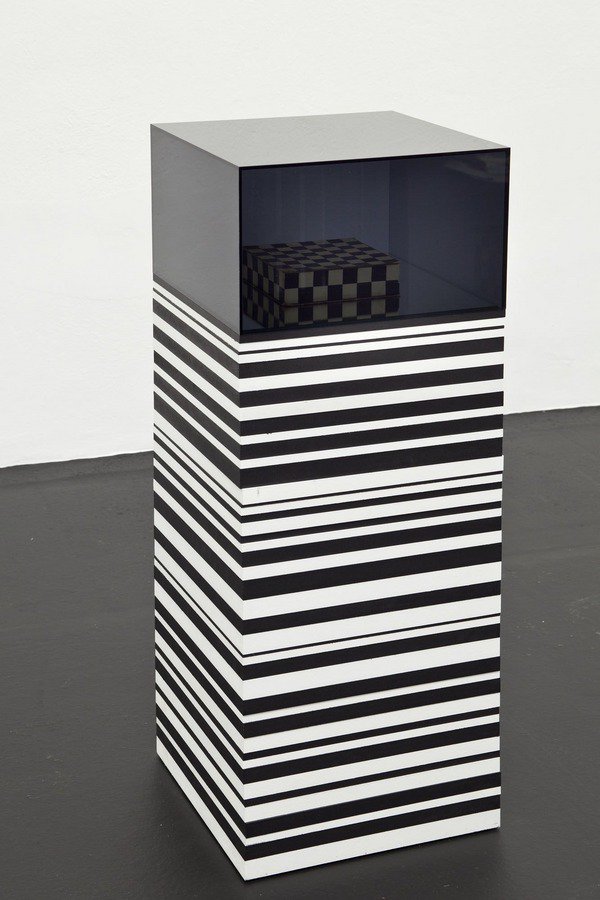Benjamin Hirte
dal 10/9/2012 al 24/11/2012
Segnalato da
10/9/2012
Benjamin Hirte
MAK Austrian Museum of Applied Arts / Contemporary Art, Wien
In his installation 'The classic mob ballet', the artist stages a dialectical play around collection contents, knowledge, and learning in a museum framework. He places MAK exhibits and presentation strategies in interaction with his own objects and paradox settings to provoke unexpected and surprising associations.

In his installation the classic mob ballet, artist Benjamin Hirte stages a
dialectical play around collection contents, knowledge, and learning in a
museum framework. He places MAK exhibits and presentation strategies in
interaction with his own objects and paradox settings to provoke unexpected
and surprising associations. the classic mob ballet is the kickoff for a new
MAK exhibition series entitled Sichtwechsel, which puts questions of the
definition and presentation of applied art in an artistic perspective.
Benjamin Hirte (b.1980 in Aschaffenburg, Germany; lives and works in
Vienna) seeks a calculated exchange between museum presentation and
fields of contemporary creativity. For example, he invites a female designer
friend of his to make a shirt from a fabric reproduced from the MAK Textiles
Collection. He designs a poster together with a graphic designer who has,
through his family, a personal relationship to the material used from the MAK
Photo Archive, or reproduces a flatware design by Philippe Starck and
combines it with a song by Malcolm McLaren. Formal elements which he
takes from found objects, utility furnishings, or designer chairs from the
Furniture Collection, in turn have an influence on Hirte’s sculptural production
process.
He undercuts the museum's educational mission by making educational and
communication tools such as object labels, posters, and seating furniture
integral parts of the exhibition itself. He juxtaposes linear material, style, or art
history surveys or narratives with alternative readings of subjective,
sometimes nostalgic associations. Plexiglass domes house spontaneously
generated contexts of meaning which afford a view of a subjective idea of
classic applied art.
Not coincidentally, Hirte has entitled his installation the classic mob ballet,
referencing the phenomenon of the “flash mob,” the spontaneous confluence
of different areas and intuitive interference in a strictly orchestrated
choreography.
Benjamin Hirte’s experimental setup is both rational and open. The dialogical
orientation of his installation not least suggests the question of who is learning
from whom here: the visitor from the museum, or the museum from its visitor?
NEW LOOK
Four young artists living and working in Vienna will be invited to develop, in an
artistic exploration, new perspectives on the definition of applied art and to
highlight some of the challenges facing a museum collection with respect to
the increasing demand for museum education.
Not only will installations and strategies developed in the NEW LOOK series
be given an institutional platform, they will also be integrated as participative
contributions in the real discourse about the reconceptualization of the MAK
Study Collections from 2014. With this project, the MAK engages in
networking, reaching out to communities of the young local art and gallery
scene and establishing cooperation with educational institutions. Planned for
2013 are three single exhibitions of Kathi Hofer, Kerstin von Gabain, and
Verena Dengler.
In a series of internal workshops, NEW LOOK will also be providing additional
impulses for the new MAK educational program which is currently being
developed. Moreover, workshops for (school) children from 4 to 16 on
“creative learning at the museum”—bookable by appointment—will be held
together with the artist. For information and appointments contact Gabriele
Fabiankowitsch, head of MAK Educational Program and Guided Tours,
T +43 1 711 36-298, education@MAK.at.
An exhibition talk with Benjamin Hirte and exhibition curator Janina Falkner
will take place on 25 Sept 2012, 6 p.m., at the MAK Gallery.
Image: The classic mob ballet MAK Gallery, 12.9.–25.11.2012 Benjamin Hirte, untitled, 2012 Display Case wood, plexiglass, mirror, lacquer for Wiener Werkstätte box, Vienna, early 20th century MAK WWPA 826 © MAK/Katrin Wißkirchen
Press contact
Judith Schwarz-Jungmann (Head), Sandra Hell-Ghignone, Veronika Träger, Lara Steinhäußer
T +43 1 71136-229, F +43 1 71136-227 presse@mak.at
Opening Tuesday, 11 September 2012, 7 p.m.
MAK Austrian Museum of Applied Arts / Contemporary Art
Stubenring 5, 1010 Vienna, Austria
Opening Hours
Tue 10 a.m.–10 p.m.
Wed–Sun 10 a.m.–6 p.m.
Mon closed
Admission
€ 7,90 / reduced € 5,50
Free admission for children and teens up to 19
Free Admission on Tuesdays 6–10 p.m.
Family ticket € 11 (2 adults and at least one child under 14)



